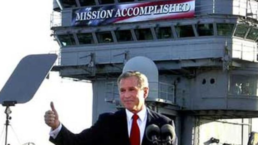From September 11, 2001, to October 7, 2023 (and beyond)
by Maha Hilal, Tom Dispatch
In a New Yorker piece published five days after the attacks of September 11, 2001, American critic and public intellectual Susan Sontag wrote, “Let’s by all means grieve together. But let’s not be stupid together. A few shreds of historical awareness might help us understand what has just happened, and what may continue to happen.” Sontag’s desire to contextualize the 9/11 attacks was an instant challenge to the narratives that President George W. Bush would soon deploy, painting the United States as a country of peace and, most importantly, innocent of any wrongdoing. While the rhetorical strategies he developed to justify what came to be known as the Global War on Terror have continued to this day, they were not only eagerly embraced by Israel in 2001, they also lie at the heart of that country’s justification of the genocidal campaign that’s been waged against the Palestinian people since October 7, 2023.
On September 20, 2001, President Bush delivered a speech to Congress in which he shared a carefully constructed storyline that would justify endless war. The United States, he said, was attacked because the terrorists “hate our freedoms — our freedom of religion, our freedom of speech, our freedom to vote and assemble and disagree with each other.” In that official response to the 9/11 attacks, he also used the phrase “war on terror” for the first time, stating (all too ominously in retrospect): “Our war on terror begins with al-Qaeda, but it does not end there. It will not end until every terrorist group of global reach has been found, stopped, and defeated.”

“Americans are asking,” he went on, “why do they hate us?” And then he provided a framework for understanding the motives of the “terrorists” precluding the possibility that American actions prior to 9/11 could in any way have explained the attacks. In other words, he positioned his country as a blameless victim, shoved without warning into a “post-9/11 world.” As Bush put it, “All of this was brought upon us in a single day — and night fell on a different world, a world where freedom itself is under attack.” As scholar Richard Jackson later noted, the president’s use of “our war on terror” constituted “a very carefully and deliberately constructed public discourse… specifically designed to make the war seem reasonable, responsible, and inherently ‘good.’”
Recent Posts
‘Unconstitutional. Unethical. Authoritarian.’ ICE Bars Millions Of Immigrants From Bond Hearings
July 18, 2025
Take Action Now One watchdog said the new policy “seems like a blatant attempt to stop them from exercising their right to due process.”……
Americans Are Not Nearly Alarmed Enough About Climate Change
July 18, 2025
Take Action Now Americans still don’t comprehend how imminent, dangerous, and far-reaching the threat is—and journalists are partly to blame.By…
The IRS Is Building A Vast System To Share Millions Of Taxpayers’ Data With ICE
July 17, 2025
Take Action Now ProPublica has obtained the blueprint for the Trump administration’s unprecedented plan to turn over IRS records to Homeland Security…
Israel’s Sudden Assault On Syria Is Unchecked Aggression
July 17, 2025
Take Action Now Jerusalem is bombing Damascus and threatening al-Sharaa’s rule, while Washington was hoping to help the nascent government on…




